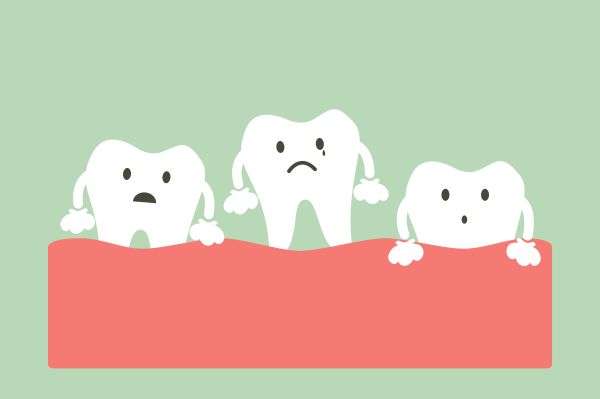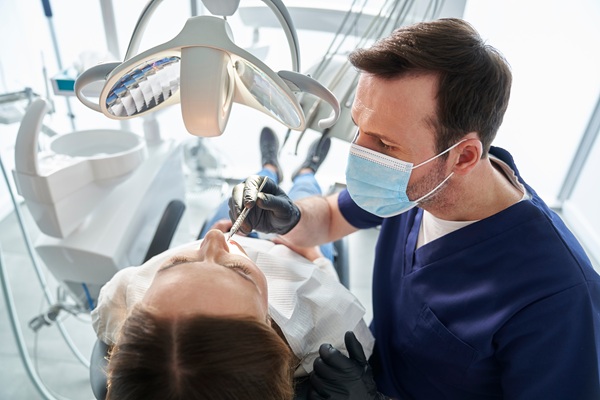How Serious Is Gum Recession?

Gum recession is an oral health issue that occurs when an individual’s gum tissue moves away or separates from the tooth. As the gum tissue recedes, it forms a small pocket of space between the gums and the teeth, exposing the tooth’s root and leaving it vulnerable to a variety of potential health risks.
The Mayo Clinic estimates that there are over 200,000 individual cases of gum recession each year. While this condition is common, many people do not understand the gravity of gum recession. Gum recession is a serious dental condition that should be treated immediately.
The dangers of gum recession
When gum tissue recedes from a tooth, it creates a gap that opens the tooth’s root to harmful bacteria. This can lead to a host of oral health problems.
Gum infection
One of the most serious problems that can come from exposure to these bacteria is an infection. Infections eat away at healthy gum tissue, exposing more of the tooth’s root. Gum infections cause gum inflammation, sensitivity and pain. Infections can also spread to other areas of the mouth, causing painful tooth abscesses and other damage that will require surgery or tooth removal. People who notice that their gums are receding should seek treatment quickly in order to prevent infection-causing bacteria from entering the space between their gums and teeth.
Tooth decay
In addition to exposing an individual’s teeth to bacteria, gum recession also leaves teeth vulnerable to plaque. Dental plaque, which also contains bacteria, sticks to teeth and wears away at the protective enamel. When plaque builds up over time, it hardens and turns into calculus, which is difficult to remove without the assistance of a dentist.
Gum recession provides space for plaque to build up, leading to tooth decay, bad breath and gum disease from calculus. As the structural integrity of the tooth becomes compromised, people experience tooth sensitivity, tooth pain and difficulty chewing. Addressing this issue can require costly crowns or root canals.
Tooth loss
Without an adequate amount of gum tissue available to secure a tooth, it is susceptible to falling out. People who ignore signs of gum recession significantly increase their risk of tooth loss, which can affect an individual’s ability to eat, talk and smile, and it typically requires dentures or dental implants to fix. People who leave their receding gums untreated are greatly increasing their likelihood of losing teeth at the affected site.
Seeking treatment for gum recession
Gum recession is an incredibly serious condition because it can lead to problems like infection, tooth decay and tooth loss, among other issues. These oral health issues often require patients to undergo costly procedures.
People experiencing gum recession should seek treatment options before this health condition further damages the integrity of their teeth. Anyone who thinks their gums might be receding can schedule a consultation with a dentist who can recommend minimally invasive gum recession treatments.
Request an appointment here: https://www.oaktreefamilydental.com or call Oak Tree Dental at (703) 763-5239 for an appointment in our McLean office.
Check out what others are saying about our services on Yelp: Read our Yelp reviews.
Recent Posts
When many people lose a single tooth, they may be inclined to ignore it and be grateful for the remaining thirty-one — despite the difficulties such a loss can cause. The good news is that getting a partial denture for one missing tooth is a relatively straightforward and largely painless procedure. Although you may experience…
Professional dental cleanings are integral for keeping your mouth healthy. They remove plaque and tartar (hardened plaque) that regular brushing and flossing cannot, leaving your teeth and gums refreshed. Maintaining healthy habits that keep your smile bright and strong is essential to make the most of a dental cleaning. Caring for your teeth properly after…
When it comes to replacing teeth, some people feel it is unnecessary to get a partial denture for one missing tooth. However, even one missing tooth can cause severe damage to the rest of the mouth and even lead to behavioral issues such as embarrassment or loss of confidence if it is not replaced with…
If you have a gap in your teeth, you may want to consider a partial denture for one missing tooth. The gap may be affecting your appearance and lowering your self-confidence. Even if the missing tooth is in the back and is not very noticeable, it is important to replace it because there are long-term…


